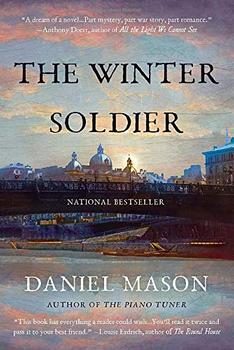Summary | Excerpt | Reading Guide | Discuss | Reviews | Beyond the Book | Readalikes | Genres & Themes | Author Bio

The King is always hunting, and the Queen is always pregnant, ran the joke about his family, paraphrasing Goethe. But he thought, In many ways, this Queen is both. His sweet-toothed father, a major in the lancers, had been shot in the hip by the Italians at the Battle of Custoza, and had intended to spend the rest of his life happily lounging about his garrison in Kraków, drinking slivovitz and perfecting hand shadows to scare his children. For the first decade of his marriage, fearing disruption to his idyll, the war hero tried to hide the sleepy family mines from Lucius's mother. Iron? There? Nothing but bat droppings. Copper? Oh, my dear, that's just a silly rumor. What, they told you there was zinc?
He had known his wife too well. No sooner did she have her hands on the balance sheets than a great rumbling was heard over southern Poland. Within three years, the Krzelewski mines had gone from providing buttons for the army's tunics and brass for its trumpets to steel and iron for the new railway to Zakopane. Soon she had moved them to Vienna so as to better grip the heart of Empire. It was only fitting, she liked to say. Vienna owed her family, ever since Sobieski liberated Austria from the Turks.
This of course was mentioned only in private. In public, she had no hesitation acquiring the necessary imperial trappings. Commemorative ceramics from Franz Josef's jubilees soon graced their mantelpieces. She had Klimt paint her portrait, first with Lucius at her side, and then, because she was enthralled by the patterns of gold on the portrait of Adele Bloch-Bauer, she had Lucius painted over. Their dynasty of Irish wolfhounds—Puszek I (1873–81), Puszek II (1880–87), Puszek III (1886–96), Puszek IV (1895–1902), etc.—all descended from none other than Empress Sisi's beloved Shadow.
Each of her children, save the eldest, had been born in Vienna. Wladyslaw, Kazimierz, and Boleslaw, Sylwia and Regelinda: names like a procession of Polish saints. By his second decade, they had all moved on. Later Lucius would learn that there were divisions among them, deep divisions, but for most of his childhood, their unity seemed impenetrable. The men drank and the women played piano very well. The men, disappearing with his father on predawn hunts from their estates in Poland and Hungary, drank a lot.
He was not surprised, therefore, that when he had first announced his intention to study medicine, his mother told him it was a field for arrivistes.
He responded that many sons of nobility became doctors. But he knew the answer before it was uttered from her thin, drawn lips.
"Yes. But our kind of doctor is not the kind of doctor you will be."
She relented in the end. Better than anyone, she knew his limitations. Alone in the beginning, unwelcome in the German medical student associations, he had found Feuermann and Kaminski similarly excluded, trying to hide their discomfort as the other students laughed among themselves.
From the first day, Lucius had thrown himself into his studies. As opposed to his two companions, who had studied at the trade-oriented Realschule, and so had already completed much of the basic sciences, Lucius's education at the hands of his governesses had consisted mostly of Greek and Latin. To his gang he said that his zoological and botanical studies had stopped at Pliny. When they laughed with him, he was amazed, as he hadn't meant it as a joke. After that, he pretended he had never heard of Darwin, and liked to say, "This whole gravity business is quite a craze." But he didn't mind the remedial courses; there was magic in the choral recitations of Linnaean classification, in the luminous Crookes tubes brought out for physics demonstrations, the lesser alchemy that bubbled in the lines of Erlenmeyer flasks.
If he loved Medicine—yes, this was the word, this giddiness, this jealous guarding against fellow suitors, this pursuit of increasingly delicate secrets to be indulged—if he loved Medicine, what he had not expected was for Her to return his affections. In the beginning, he noticed only this: when he spoke of Her, his stutter vanished. There were no exams until the end of his second year, and so it was only one cold day in December, during his third semester, that there came the first hint that he possessed, in the words of that year's assessment, "an unusual aptitude for the perception of things that lie beneath the skin."
Excerpted from The Winter Soldier by Daniel Mason. Copyright © 2018 by Daniel Mason. Excerpted by permission of Little Brown & Company. All rights reserved. No part of this excerpt may be reproduced or reprinted without permission in writing from the publisher.




Show me the books he loves and I shall know the man...
Click Here to find out who said this, as well as discovering other famous literary quotes!
Your guide toexceptional books
BookBrowse seeks out and recommends the best in contemporary fiction and nonfiction—books that not only engage and entertain but also deepen our understanding of ourselves and the world around us.